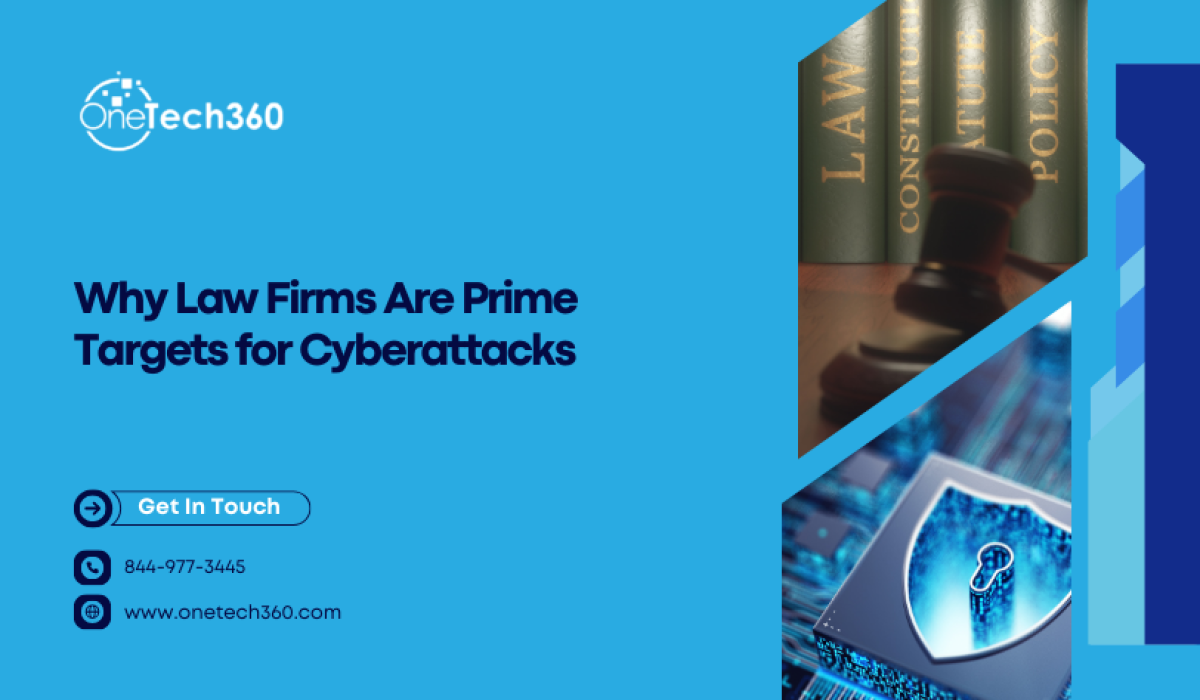Small Firms, Big Risk for Law Firm Cybersecurity
Law firm cybersecurity has become a growing concern, especially for small and mid-sized firms that assume cyberattacks only affect large corporations. In reality, law firms of all sizes handle sensitive client data every day, rely heavily on digital communication, and often operate without the security structure that larger organizations take for granted.
In reality, small and mid-sized law firms are some of the most attractive targets for cybercriminals. They handle highly sensitive information every day, depend heavily on digital communication, and often lack the layered security infrastructure that larger organizations have built over time.
Client records, legal strategies, financial documents, medical details, personal identifiers, and confidential correspondence all pass through a law firm’s systems. To an attacker, that data is just as valuable as what sits inside a Fortune 500 company. In many cases, it’s even easier to access.
The issue is not negligence. Most firms are doing the best they can with the resources available to them. The risk comes from how modern legal work is structured and how attackers take advantage of common habits.
Strong law firm cybersecurity protects client confidentiality, reduces downtime, and helps your team work with confidence.
Limited IT Support Creates Opportunity
Most small and mid-sized firms do not maintain an internal IT department. Instead, they rely on a local provider or a general technical consultant who supports many businesses at once. While these providers are often competent and well-intentioned, they typically focus on keeping systems running rather than building proactive security strategies.
Security requires constant attention. It involves monitoring, updating, testing, and planning for scenarios that may never happen but must be anticipated anyway. When IT support is stretched thin across dozens of clients, cybersecurity becomes reactive instead of preventative.
This creates an environment attackers actively seek out. They know that firms without dedicated security oversight are less likely to detect early warning signs, such as unusual logins, abnormal email activity, or subtle data access patterns.
Law firms operating this way are not careless. They simply assume their size keeps them off the radar. Unfortunately, attackers understand that this assumption is common, which makes these firms even more appealing.
Email Security and Law Firm Cybersecurity
Email remains the most common entry point for cyberattacks, and law firms are especially vulnerable.
Legal professionals rely on email more than almost any other industry. Client updates, court notices, contracts, billing questions, settlement discussions, and internal coordination all flow through inboxes every day. Email is fast, familiar, and deeply embedded in legal workflows.
Attackers exploit this dependence.
A message marked urgent, referencing a client matter, or appearing to come from a colleague creates immediate pressure. Attorneys and staff are trained to respond quickly, particularly when deadlines or legal consequences are involved. That urgency reduces skepticism, even among experienced professionals.
Phishing emails today are far more sophisticated than they were years ago. They use realistic language, familiar names, and accurate context pulled from publicly available information. Some are even tailored to specific firms or individuals, making them nearly indistinguishable from legitimate messages at first glance.
Once a malicious link is clicked or credentials are entered, attackers can gain access without triggering alarms.
Improving law firm cybersecurity often starts with email protection, since phishing remains one of the most common entry points.
For more guidance on recognizing phishing and protecting your organization, CISA’s cybersecurity resources offer practical, up-to-date best practices.
File Sharing Adds Another Layer of Risk
Document sharing is essential in legal work. Firms routinely exchange files with clients, courts, opposing counsel, and partners. Tools like cloud storage platforms make collaboration easier, but they also introduce new vulnerabilities.
Shared links can be forwarded without permission. Folder invitations may appear legitimate but come from impersonated accounts. Files can be uploaded and accessed before anyone verifies the sender’s identity.
Attackers take advantage of trust. They often pose as clients or collaborators, sending links that look routine and harmless. When someone clicks, the attacker gains a foothold inside the firm’s workflow.
From there, it becomes easier to observe activity, harvest credentials, and quietly move through shared documents. Because everything looks normal on the surface, breaches can go unnoticed for long periods.
Irregular Work Hours Create Security Gaps
Legal professionals rarely work predictable schedules. Early mornings, late nights, weekends, and emergency client requests are all part of the job. While this flexibility keeps firms responsive, it also creates security blind spots.
When working outside the office, attorneys may use personal devices or home networks to stay productive. These environments often lack the protections found in an office setting. Software updates may be delayed. Antivirus tools may be outdated. Wi-Fi passwords may be weak or shared with family members.
Personal computers are also more likely to be used for everyday activities such as browsing, streaming, or downloading files. This increases exposure to malicious websites and accidental downloads.
Attackers know that security controls are weaker outside controlled environments. They target moments when professionals are tired, rushed, or working remotely because those are the times when caution tends to slip.
Physical Mail Still Poses a Threat
While many industries have shifted almost entirely to digital communication, physical mail remains common in law firms. Courts, clients, and other firms continue to send documents in physical form, and attackers are aware of this.
One particularly effective tactic involves malicious flash drives. A package may arrive claiming to contain evidence, media files, or supporting documentation related to a case. A handwritten note might ask the recipient to review the contents quickly.
Curiosity and professionalism work against the firm in these situations. Plugging in an unknown device feels less risky than clicking a suspicious link, but the result can be far worse.
Once connected, a compromised device can install malicious software without any visible signs. From there, attackers can monitor activity, copy files, and spread through connected systems.
This method may seem outdated, but it continues to succeed because people generally trust physical objects more than digital messages.
Why Attackers Favor Law Firms
Each of these vulnerabilities is concerning on its own. Together, they create a highly attractive environment for cybercriminals.
A firm without dedicated security oversight, heavy reliance on email, frequent document sharing, inconsistent work environments, and continued use of physical media presents multiple entry points. Once inside, attackers can move slowly and quietly, reducing the chance of detection.
The potential payoff is significant. Law firms hold data that cannot easily be replaced or dismissed. Breaches may expose confidential client matters, financial details, personal information, or legal strategies.
Even a brief disruption can delay filings, interrupt court deadlines, damage reputations, and create ethical or legal consequences. Attackers understand the pressure this creates and often use it to demand payment or further access.
The Myth of Safety Through Size
One of the most persistent misconceptions in the legal industry is that small firms are too insignificant to attract attention. In reality, attackers often prefer smaller targets.
Large organizations invest heavily in security teams, monitoring tools, and incident response plans. Smaller firms typically do not. The effort required to breach a small firm is often far lower, while the value of the data remains high.
Legal professionals should recognize that the information they handle is valuable regardless of firm size. Personal stories, financial records, intellectual property, and confidential communications are all attractive to attackers.
Understanding this reality is the first step toward meaningful protection.
Building Stronger Habits for Law Firm Cybersecurity
Improving security does not require abandoning efficiency or overhauling every system overnight. It starts with awareness and intentional changes to daily habits.
Training staff to pause before opening unexpected attachments or clicking unfamiliar links can prevent many attacks. Encouraging verification of unusual requests, even when they appear urgent, significantly reduces risk.
Multi-factor authentication is another powerful tool. By requiring a second form of verification, firms make it much harder for attackers to succeed, even if a password is compromised.
Choosing IT partners with security expertise also matters. Support providers who understand the legal industry can help firms implement protections tailored to their workflows rather than generic solutions.
You can also review the FTC’s online security tips for simple steps that help protect accounts and sensitive information.
Practical Steps for Safer Work Outside the Office
Remote work does not have to be insecure. Firms can reduce risk by providing secure, firm-managed devices for remote access. Laptops with updated security controls, encrypted storage, and monitored access are far safer than personal computers.
Clear guidelines can help staff understand what is and isn’t acceptable when working remotely. Avoiding work on shared household devices, keeping software up to date, and using secure connections all make a difference.
Even small adjustments, such as limiting access to sensitive systems outside business hours, can reduce exposure.
Clear policies and secure remote access tools strengthen law firm cybersecurity without slowing down your team.
Handling Physical Media More Safely
Physical mail should be treated with the same caution as digital communication. Unexpected devices or requests should be verified before being opened.
Some firms maintain an isolated computer that is never connected to the main network. This allows suspicious media to be examined without risking core systems. While this may sound extreme, it provides an extra layer of protection against uncommon but serious threats.
The key is consistency. Establishing procedures ensures that staff do not have to make judgment calls under pressure.
Awareness Is the Strongest Defense
Most security risks in law firms stem from a desire to work efficiently and serve clients well. Attackers exploit trust, urgency, and routine.
Becoming more secure does not mean becoming fearful. It means understanding how attacks happen and adjusting habits accordingly.
Firms that combine thoughtful procedures, reliable technology, and regular training create environments that are far harder to compromise. While attackers may continue to view law firms as attractive targets, those firms can significantly reduce their risk by staying informed and prepared.
The goal of law firm cybersecurity isn’t perfection; it’s reducing risk and responding faster when something goes wrong.
Final Thoughts on Why Law Firms Are Targets for Cyberattacks
Cyberattacks are not just a technical issue for law firms. They are a business, ethical, and client trust issue.
Understanding why law firms are targeted helps leaders make better security decisions. By strengthening habits, choosing the right tools, and working with knowledgeable partners, firms can protect their data, clients, and reputations.
Security is not about eliminating risk entirely. It’s about managing it thoughtfully and responsibly in a profession built on trust.
Have questions about protecting your firm? You can get in touch with our team through the Contact Us page to start the conversation.
Have questions about protecting your business? You can contact our team through the Contact Us page.

